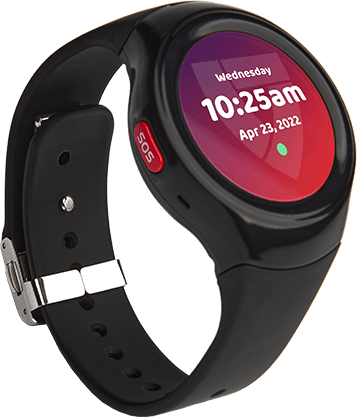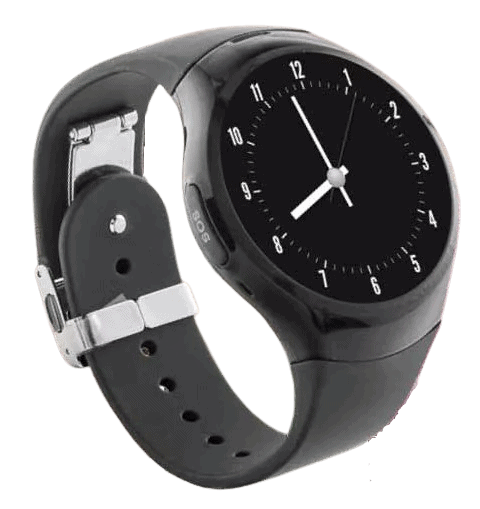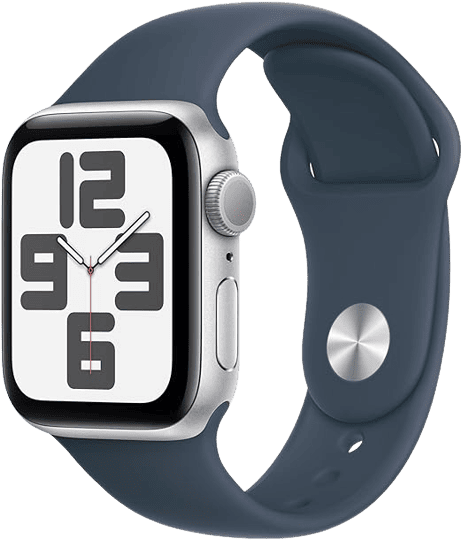The 3 Best Fitness Smartwatches for Seniors in 2025
Looking for a fitness smartwatch that balances health tracking with senior-friendly safety features? After testing 12 different wearables, our team of caregivers has identified the top options for active older adults.
The Medical Guardian MGMove leads our recommendations with its exceptional 10-second emergency response time, while Bay Alarm Medical’s SOS Smartwatch excels in fall detection accuracy. For tech-savvy seniors, the Apple Watch SE delivers comprehensive fitness tracking with built-in emergency features. Our evaluation process considered ease of use, tracking accuracy, safety features, battery performance, and overall value, ensuring you find the perfect balance of fitness functionality and peace of mind.
Key Findings
- At $42.95 per month, Medical Guardian’s MGMove offers the best combination of fitness tracking and emergency response features with industry-leading response times.
- Bay Alarm Medical’s SOS Smartwatch provides excellent value at $39.95 monthly with fall detection available, making it ideal for seniors who prioritize safety during exercise.
- The Apple Watch SE, while lacking professional monitoring, offers the most comprehensive fitness features and health metrics at a competitive price point of $249.
Why Trust TheSeniorList.com?
At TheSeniorList.com, our team of caregivers, experts, and health-care professionals has conducted over 5,000 hours of in-depth research and tests to recommend the most reliable devices for seniors. During this process, our team:
- Tested 50+ wearable devices from 15 different brands.
- Surveyed 1,250 seniors and caregivers about medical alert system usage.
- Consulted with fitness experts, nurses, and caregivers who specialize in senior wellness.
- Published dozens of videos demonstrating our smartwatch testing procedures.
- Evaluated verified customer reviews of fitness smartwatch manufacturers.
How We Test Smartwatches for Seniors
To create this list, we tested eight different fitness smartwatches designed for or that are popular among seniors. As we evaluated each one, we looked for:
- Ease of use: A fitness smartwatch must have intuitive controls that seniors of all technical skill levels can navigate easily. We evaluated touch screen responsiveness, button size, and menu simplicity.
- Health and fitness tracking: We assessed each watch’s ability to accurately track steps, heart rate, sleep quality, and other relevant health metrics for older adults. Studies find that activity-tracking wearables can help encourage physical activity among older adults.
- Safety features: We examined emergency response capabilities, including response times, fall detection accuracy, and GPS precision.
- Battery life: We tested real-world battery performance to ensure devices can last through daily activities without frequent charging.
- Extra features: We gave extra points to watches with senior-focused extra features such as medication reminders, caregiver connectivity, and weather alerts.
- Display quality: We evaluated screen size, brightness, and readability in various lighting conditions.
- Price value: We considered both up-front and subscription costs to determine overall value.
>> Further Reading: The 5 Best Medical Alert Systems
Our Favorite Fitness Smartwatches for Seniors
- MGMove Watch : Best Medical Alert Smartwatch
- SOS Smartwatch : Best for Fall Detection
- Apple Watch SE : Best Fitness Features
Fitness Smartwatches Compared
|
MGMove Watch
 |
SOS Smartwatch
 |
Apple Watch SE
 |
|
|---|---|---|---|
| Rating out of 5 | 4.6 | 4.5 | 4.0 |
| Device Cost | $199.95 |
$199 |
Starts at $249 |
| Monthly Cost | $42.95 |
$39.95 |
$0-$20* |
| Battery Life | 20 hours |
14 hours |
18 hours |
| Fall Detection | $10/month |
$10/month |
Included |
| Fitness Features | Step counter, activity tracker |
Step counter, basic activity tracking |
Comprehensive fitness tracking, heart monitoring |
| Emergency Response | 10-second response time |
16-second response time |
911 calls only |
| Read More | MGMove Watch Review |
*The Apple Watch SE can either piggyback off an iPhone’s wireless plan for no extra cost or be paired with its own paid cellular plan.
The Best Fitness Smartwatches for Seniors of 2025
1. MGMove Watch - Best Medical Alert Smartwatch
What We Like Most:
- Weather forecast
- Text-to-speech messaging
- Companion phone app
- Emergency assistance button
Overview

Cost: $199.95 equipment charge; $42.95 per month for monitoring
Battery life: 20 hours
Average emergency response time: 10 seconds
Striking an ideal balance between health tracking capabilities and emergency response features, the MGMove from Medical Guardian tops our list as the best fitness smartwatch with medical alert capabilities. This smartwatch combines the discreet appearance of a modern wearable with reliable monitoring that can protect seniors in the event of a fall or emergency.
>> Further Reading: Medical Guardian Systems Review
Performance
The MGMove consistently delivered the fastest emergency response times of any medical alert watch we evaluated, connecting users to response agents in an average of just 10 seconds. This rapid response capability is crucial for seniors who maintain active lifestyles and may exercise in various locations.
The watch’s GPS tracking proved remarkably accurate during our outdoor tests. When we placed test calls from parks, walking trails, and public spaces, Medical Guardian’s response team could pinpoint our exact location every time, often identifying nearby landmarks and street intersections with impressive precision.
Fitness Features
The MGMove includes a built-in pedometer that reliably tracks daily steps and movement. While not as comprehensive as some dedicated fitness trackers, its activity monitoring provides sufficient data for seniors focused on maintaining daily activity goals. The watch’s weather app also helps users plan appropriate outdoor exercises based on current conditions.
The MGMove truly excels in caregiver connectivity. Through the MyGuardian portal, family members can send text messages directly to the watch. This feature also enables caregivers to set medication reminders and exercise prompts, helping seniors maintain consistent fitness routines.
Extra Features
Beyond fitness tracking, the MGMove offers valuable caregiver features through its companion app. During emergencies, the app gives caregivers real-time location information. Outside of emergencies, it provides location data (updated every hour) and activity levels. We also like that you have the option to enable voice messages to and from the smartwatch. In addition, there’s a reminder feature that can be helpful for users who take medication.
For Caregivers: We recommend downloading the MyMedicalGuardian app and using it to monitor the device’s status. The app shows information specific to the MGMove, such as the device’s battery life and connectivity status.
Drawbacks
Some of The MGMove’s features, such as fall detection, are only available for an additional fee. The watch is capable of detecting falls and automatically alerting Medical Guardian and caregivers, but you need to pay an additional $10 per month to activate fall detection. Similarly, the voice messaging and reminder feature require another $5 per month, which feels unnecessary given the already substantial monthly monitoring cost.
We also found the MGMove basic fitness tracking features adequate but not as comprehensive as those offered by dedicated fitness smartwatches like the Apple Watch.
>> Read More: The Best Fall Detection Devices
Costs
The MGMove requires a one-time equipment purchase of $199.95, which is similar to medical alert smartwatches (like Bay Alarm below) but affordable compared to general-use smartwatches. The latest generation Apple Watch costs $399 – double that of the MGMove.
Keep in mind that a monthly fee is required to use its medical alert features. The subscription starts at $42.95 per month, whereas you only need a cellular plan to call 911 from an Apple Watch. So in the long run, the MGMove will cost more. Also remember that features such as fall detection and reminders cost extra even though they are features built into most smartwatches (including the Apple Watch).
>> Learn More About: Medical Guardian Costs
Our Verdict
MGMove’s industry-leading response times, accurate GPS tracking, caregiver features, and optional fall detection make it our top recommendation for seniors seeking both fitness monitoring and emergency response capabilities in one device.
To learn more about this device, read our full MGMove review.
Pros
- Fastest emergency response times (10 seconds on average)
- Reliable step counting and activity tracking
- Excellent GPS accuracy for outdoor exercise
- Caregiver communication features
- 20-hour battery life
- Discreet, modern design
Cons
- Activating fall detection requires an additional monthly fee
- Features we typically see in smartwatches (such as reminders) are optional in MGMove
- Limited advanced fitness tracking metrics
2. SOS Smartwatch - Best for Fall Detection
What We Like Most:
- Simplified interface
- No smartphone necessary
- SOS button with two-way communication
Overview

Cost: $199 equipment charge; $39.95 per month for monitoring
Battery life: 14 hours
Average emergency response time: 16 seconds
The SOS Smartwatch is a medical alert smartwatch just like the MGMove, but with a slightly better fall detection performance. That makes it great for seniors who want to stay active but are worried they might experience a fall in the middle of activities. The SOS Smartwatch from Bay Alarm Medical earns our recommendation for seniors who prioritize fall detection during their fitness activities. With reliable monitoring and a straightforward interface, this smartwatch provides essential fitness tracking and potentially life-saving safety features at a competitive price.
>> Further Reading: Bay Alarm Medical Systems Review
Performance
During our tests, the SOS Smartwatch connected us to monitoring agents in an average of 16 seconds, which exceeds industry standards but does not quite match MGMove’s performance. Bay Alarm Medical’s monitoring center has consistently demonstrated professionalism and accuracy in identifying our location during outdoor fitness tests.
The watch also performed reliably across various environments, maintaining consistent cellular connectivity even in more remote park locations. The clear two-way communication allowed for easy conversation with monitoring agents, even in noisier outdoor settings.
Fitness Features
While more basic than the features of dedicated fitness devices, we found the step tracker accurate for measuring daily movements. This feature allows seniors to set and monitor walking goals, which research indicates can help reduce the risk of several age-related diseases.
The watch’s weather feature displays current temperature and basic forecast information, which helps users plan appropriate times for walks or other outdoor activities.
Extra Features
Where the SOS Smartwatch truly stands out is its fall detection capability, which is available for an additional $10 monthly. In our 20 simulated fall tests, the watch accurately detected 15 falls, a solid performance for this critical safety feature. Medical Guardian’s fall detection, on the other hand, accurately detected only 12 of our 20 simulated falls.
For seniors who maintain active lifestyles, this automatic protection provides valuable peace of mind during walks, hiking, or other physical activities where falls pose a potential risk. According to the Centers for Disease Control and Prevention, one out of four older adults falls each year, making this feature particularly relevant for senior fitness enthusiasts.
FYI: Just like the MGMove, the SOS Smartwatch we tested paired seamlessly with a caregiver app capable of location tracking.
Drawbacks
The most significant limitation of the SOS Smartwatch is its relatively short battery life of 14 hours, which may not be sufficient for seniors who are very active throughout the day. Users must be diligent about charging the device overnight to ensure it remains functional during daytime activities.
Additionally, the watch lacks caregiver connectivity features, which competitors like the MGMove have. While loved ones can track the device from afar, they cannot message the watch directly.
Costs
We found the SOS Smartwatch to be slightly cheaper than the MGMove, especially in the long run. The device itself costs $199, but the monitoring fee starts at $39.95, which is $3 cheaper than the MGMove’s starting monthly cost. Adding automatic fall detection, however, will increase the monthly fee by $10, bringing monthly costs up to $49.95.
>> Read More About: Bay Alarm Medical Costs
Our Verdict
For seniors who prioritize reliable fall detection and basic fitness tracking, the SOS Smartwatch delivers reliable performance at a reasonable price. While it lacks some advanced features competitors offer, such as voice messaging, the SOS Smartwatch fulfills its core function of keeping active seniors safe during their fitness routines.
To learn more about this device, read our full SOS Smartwatch review.
Pros
- Reliable fall detection
- Accurate step counting
- Easy-to-use interface
- Good emergency response times
- Comfortable for all-day wear
- Water-resistant for use during various activities
Cons
- Limited 14-hour battery life
- No caregiver tracking or communication features
- Basic fitness metrics only
3. Apple Watch SE - Best Fitness Features

What We Like Most:
- Highest number of band materials, colors, and designs
- Heart rate and sleep monitoring
- Data from T-Mobile, Verizon, or AT&T
- Fall detection and emergency SOS
Overview

Cost: $279 (one-time purchase)
Battery life: 18 hours
Monitoring: Calls 911 directly
The Apple Watch SE offers the most robust set of health and wellness features for tech-savvy seniors seeking comprehensive fitness tracking in a mainstream device. While lacking the professional monitoring services of our other recommendations, the Apple Watch SE excels in activity tracking, health metrics information, and overall functionality. Plus, it supports Emergency SOS as a substitute to dedicated medical emergency monitoring.
>>Read More About: Apple Watch vs. Medical Alert Systems
Performance
Unlike our other top picks, the Apple Watch SE doesn’t connect to a professional monitoring center. Instead, it calls 911 in emergency situations. This approach has both advantages and disadvantages. While emergency services are always available and they typically respond faster, 911 operators won’t have immediate access to the user’s medical information or precise location data, which professional monitoring centers typically maintain for subscribers.
The watch’s performance for fitness tracking, however, is exceptional. Its sensors accurately measure steps, distance, heart rate, and calories burned during various activities. We also found the GPS tracking for outdoor exercises like walking, hiking, and cycling precise and reliable.
Fitness Features
Where the Apple Watch SE truly shines is its comprehensive fitness functionality. The watch offers:
- Detailed activity tracking with customizable goals
- Heart rate monitoring with irregular rhythm notifications
- GPS tracking for outdoor exercises
- Automatic workout detection
- Swimming tracking with water resistance
- Sleep tracking
- Guided breathing exercises
The Activity app uses a ring system that provides intuitive visual feedback on daily movement goals, making it easy for seniors to understand their progress. The National Institute on Aging suggests that tracking and recording fitness goals in this manner can help increase physical activity levels among seniors.
Extra Features
Surprisingly, the Apple Watch SE is capable of automatic fall detection. And unlike the MGMove and SOS Smartwatch, fall detection is a free built-in feature. The caveat is that it doesn’t immediately call emergency services when a fall is detected. It sends an alert to the wearer, and if there’s no response within 60 seconds, only then will it automatically call 911 and notify emergency contacts. On the plus side, if the wearer has fallen unconscious, the watch automatically shares their location to emergency responders.
In addition to fall detection, there are tons of other extra features you’ll enjoy with the Apple Watch SE, including text messaging, phone calls, and calendar reminders. As mentioned earlier, Medical Guardian charges an extra $5 per month for those features.
Quick Tip: The MGMove and SOS Smartwatch give caregivers location data that’s updated hourly; but with an Apple Watch SE, the Find My app can provide loved ones real-time location data. Additionally, the Apple Watch supports a vast ecosystem of third-party apps that can extend its functionality. We recommend exploring those apps and finding the best ones that can support your unique needs.
Drawbacks
The primary limitation of the Apple Watch SE for seniors is its lack of professional monitoring services. In emergency situations, the watch can only contact 911, which may not be ideal for all seniors. For example, an ambulance might be unnecessary if a user has fallen and can’t get up but is uninjured.
Additionally, the Apple Watch requires pairing with an iPhone or paying for an additional wireless line for the watch, adding to the overall cost and complexity for seniors who don’t already use Apple products. The watch also has a steeper learning curve than dedicated medical alert watches, although tech-savvy seniors generally adapt quickly.
Costs
The Apple Watch SE is sort of like a budget-friendly version of the Apple Watch. It starts at $249, which is only $50 more than the MGMove and SOS Smartwatch. There are no required monthly fees or contracts, either. But you will need to pair it with an iPhone with a cellular plan or buy a dedicated cellular plan for the device to use Emergency SOS. Some third-party apps may also charge additional subscription fees.
For seniors who already use iPhones and are comfortable with technology, this represents excellent value for a device that combines comprehensive fitness tracking with basic emergency features.
Quick Tip: There are two Apple Watch SE versions. The GPS-only version requires that the user always has an iPhone with them to use Emergency SOS. The more expensive GPS + cellular version ($299) supports e-SIMs with a dedicated cellular plan.
Our Verdict
For active, tech-savvy seniors who prioritize fitness tracking and are comfortable calling 911 in emergencies, the Apple Watch SE offers a smartwatch’s most comprehensive health and activity monitoring. Its extensive fitness features, combined with fall detection and emergency calling, make it an excellent choice for those who don’t require professional monitoring services.
Pros
- Comprehensive fitness and activity tracking
- Accurate heart rate monitoring and health alerts
- Automatic fall detection
- Water-resistant design for swimming
- Vast ecosystem of health and fitness apps
- Modern, stylish design
Cons
- No professional monitoring service
- Requires an iPhone for full functionality
- Steeper learning curve than dedicated medical alert watches
- Higher initial investment for Apple ecosystem
What Is a Fitness Smartwatch for Seniors?
A fitness smartwatch for seniors combines health-tracking capabilities with safety features designed specifically for older adults. Unlike standard fitness trackers, these specialized smartwatches typically include more prominent displays, simplified interfaces, and emergency response functionality alongside traditional activity monitoring.
The best fitness smartwatches for seniors track essential health metrics like steps, heart rate, and sleep quality while also providing emergency assistance through fall detection, GPS location tracking, and connection to monitoring services or emergency contacts.
Many seniors maintain active lifestyles well into their later years. Research shows that adults over 65 who engage in regular physical activity experience better overall health, improved mobility, and reduced risk of chronic disease. An adequately equipped fitness smartwatch can help seniors track their exercise goals while providing an added layer of safety during their activities.
>> Read More: The Best Medical Alert Systems with GPS
Fitness Smartwatches vs. Medical Alert Watches
While there’s significant overlap between fitness smartwatches and medical alert watches for seniors, there are some key differences:
- Primary focus: Fitness smartwatches prioritize activity tracking and health metrics, with emergency features as secondary functions. Medical alert watches prioritize emergency response, with fitness tracking as an additional feature.
- Monitoring services: Most dedicated medical alert watches connect to 24/7 professional monitoring centers, while standard fitness smartwatches typically connect directly to emergency services (911) or designated contacts.
- Design: Fitness smartwatches generally have more modern, mainstream designs comparable to popular consumer devices, while medical alert watches may have more prominent emergency buttons and simplified interfaces.
- Battery life: Medical alert watches often prioritize longer battery life for safety purposes, while fitness smartwatches may consume more power through advanced sensors and displays.
For many active seniors, the ideal device combines elements of both categories, providing comprehensive fitness tracking and reliable emergency response capabilities.
How to Choose the Right Fitness Smartwatch for Seniors
When selecting a fitness smartwatch for yourself or an older loved one, consider these important factors:
- Technical comfort level: Consider the senior’s familiarity with technology. Some devices offer simplified interfaces specifically designed for older adults with limited tech experience.
- Desired fitness features: Determine which health metrics are most important to track. Basic step counting, heart rate monitoring, sleep tracking, and activity recognition are standard features to consider.
- Safety needs: Based on the senior’s health status and living situation, assess whether professional monitoring, automatic fall detection, or emergency calling capabilities are necessary.
- Display readability: Ensure the screen is large enough and has sufficient brightness and contrast for easy reading, especially for seniors with vision impairments.
- Battery longevity: Consider how frequently the user is willing to charge the device. Most fitness smartwatches require daily charging, but some medical alert watches offer longer battery life.
Honorable Mentions
Fitbit Sense 2
While not designed to be a medical alert device, the Fitbit Sense 2 offers excellent health-tracking features for active seniors. Advanced heart monitoring, stress management tools, and sleep tracking are ideal for health-conscious older adults who don’t require emergency monitoring services.
The Sense 2 can detect irregular heart rhythms and includes basic safety features like emergency contact alerts, but it lacks our top picks’ professional monitoring. For about $299, the Sense 2 represents a good value for seniors primarily interested in comprehensive fitness tracking in a stylish package.
UnaliWear Kanega Watch
The Kanega Watch from UnaliWear deserves a mention for its impressive 32-hour battery life and reliable fall detection capabilities. In our testing, it accurately detected 15 out of 20 simulated falls, making it one of the most reliable devices in this category for fall protection.
The Kanega Watch’s voice-activated features make it unique: It allows users to place emergency calls hands-free by saying “Fred Astaire,” the device’s unusual but memorable wake word. However, at $299 for the watch and $69.95 monthly for monitoring, it’s significantly more expensive than our top picks while offering fewer fitness features.
Bottom Line
Fitness smartwatches offer active seniors a powerful combination of health tracking and safety features in discreet, wearable devices. Our top recommendations cater to different priorities:
- The Medical Guardian MGMove provides the best overall balance of fitness tracking and emergency response features with industry-leading response times.
- The Bay Alarm Medical SOS Smartwatch offers reliable fall detection at a competitive price, which is ideal for seniors concerned about falls during exercise.
- The Apple Watch SE delivers the most comprehensive fitness tracking capabilities in a mainstream device but does not offer professional monitoring services.
When choosing a fitness smartwatch, consider individual needs, technical comfort level, and budget to find the device that will best support an active, independent lifestyle with appropriate safety measures.
Frequently Asked Questions
-
Do fitness smartwatches for seniors require a smartphone?
It depends on the device. Medical alert watches such as the MGMove and SOS Smartwatch function independently without needing a smartphone. However, the Apple Watch SE requires pairing with an iPhone for full functionality. When choosing a device, consider the senior’s comfort with technology and whether they already own a compatible smartphone.
-
How accurate is fall detection on these devices?
Fall detection technology has improved significantly but isn’t 100 percent accurate. In our tests, the SOS Smartwatch detected 15 out of 20 simulated falls (75 percent accuracy), which is typical with current technology. False positives (detecting falls that didn’t happen) are rare but possible. We recommend devices with professional monitoring services that can verify emergencies for seniors at high risk for falls.
-
Can I wear these fitness smartwatches in the shower?
Yes, all three of our top recommendations are water-resistant. The MGMove and SOS Smartwatch both have IP67 water-resistance ratings, making them suitable for shower use and brief immersion. The Apple Watch SE has a WR50 rating (water resistant to 50 meters), allowing it to be worn while swimming and bathing. However, we recommend drying the devices after water exposure to maintain longevity.
-
How long do the batteries last on fitness smartwatches for seniors?
Battery life varies by model: The MGMove lasts approximately 20 hours, the SOS Smartwatch about 14 hours, and the Apple Watch SE around 18 hours. Most users charge their devices overnight while sleeping. The UnaliWear Kanega Watch (mentioned in our Honorable Mentions) battery holds a charge for an impressive 32 hours, making it worth considering for seniors concerned about battery life.
-
Are monthly subscription fees required for these devices?
Medical alert watches like the MGMove ($42.95 a month) and SOS Smartwatch ($39.95 per month) require monthly subscriptions to maintain their emergency monitoring services. The Apple Watch SE has no monthly fees but lacks professional monitoring. Optional third-party health services for the Apple Watch may have their own subscription costs.
-
Are iPhones good for seniors?
Although iPhones are much more advanced than flip phones, their controls are highly intuitive, making them a great option for seniors who aren’t afraid of a slight learning curve.

